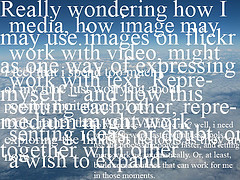11 The sayings of the wise are like goads, and like nails firmly fixed are the collected sayings that are given by one shepherd. 12 Of anything beyond these, my child, beware. Of making many books there is no end, and much study is a weariness of the flesh. The end of the matter; all has been heard. Fear God, and keep his commandments; for that is the whole duty of everyone. For God will bring every deed into judgement, including every secret thing, whether good or evil.
Ecclesiastes 12:11-12
You know the feeling. It’s when the grey lump between our ears tires from the ever accumulating piles of input and bytes. It’s the spent feeling from information overload as a digital world overruns our neurons’ processing capabilities. It’s the feeling that wise Solomon described nine hundred years before Christ as he wrote about “a weariness of flesh” from books to no end and much study.
I think it was what poet T. S. Eliot was feeling as he looked back over “twenty centuries” and lamented:
Where is the wisdom we have lost in knowledge?
Where is the knowledge we have lost in information?
Throughout the ancient world, Solomon was regarded as the wisest of all. Caravans of kings and queens traveled from afar to sit in court and hear the legendary wisdom of Solomon (I Kings 4). Solomon wrote three of the books of the Bible (Proverbs, Ecclesiastes, Song of Songs), with three thousand additional proverbs, and many discourses on the natural sciences. But Solomon knew the utter weariness of many books and learning if it does not bring us to “the end of the matter.”
Solomon spoke of books without end, but what would he have thought of our proliferation of words today! In 2009, in just the United States, there were 288,355 new books published. It is claimed that the Reuters news agency produces 27,000 pages of information every second. People carry with them more books in their Kindle than Solomon saw in a lifetime. Facebook users spend 8 billion minutes on the social networking site every day. With our phones now becoming computers, many people are never offline, or ever “out of touch” with the world.
In Digital Delirium, cultural critics Arthur and Marilouise Kroker write about the “law of reversal”, which is the brain’s self-protective reaction to information overload, causing the brain to shut down. In practical terms, the law of reversal means that “the faster the tech, the slower the speed of thought”. And the quicker we know, the less we come to care. We become so overwhelmed with factoids that eventually we shrug, “whatever”.
While we in the West continue to watch an average of 26-28 hours of television each week, our time spent online continues to rise each year. How many times do we hear someone say, “I went online to look something up, and got off an hour later having completely forgotten why I had gone online”.
As a news addict in recovery, I am chastened by C. S. Lewis biographers who say that Lewis never read the newspapers. Yet for many years C. S. Lewis was the topic of more doctoral dissertations worldwide than any other subject! There is wisdom beyond the daily blitz of media and infotainment. We might take to heart Thoreau’s warning: “Read not the Times. Read the eternities.”
And now, I bring my surplus of words to Solomon’s bottom line: “The end of the matter; all has been heard. Fear God, and keep his commandments“. The same Solomon who counsels that “the fear of the Lord is the beginning of wisdom” (Proverbs 1:7), also counsels that the fear of the Lord is the end of the matter.
If the onslaught of words and gigabytes do not bring us any closer to the fear and reverence of the Lord, then we are doomed to be like those of whom the Apostle Paul warned, “as ever learning but never coming to the knowledge of the truth” (II Timothy 3:7).
In a widely discussed and heralded column this past week, foreign policy icon, Walter Russell Mead laments the lack of leadership in America today. Then Mead connects this lack of leadership to the fact that we are “the first generation in American history to be raised in a Scripture-free educational environment.” Mead soberly concludes: “I can’t help but think that the abandonment of serious religion by most of the American elite has coincided with a massive collapse of both the public and private morality of the American establishment”. I think here of Lincoln, who as a boy, had the meager, but rich library consisting of a Bible.
Solomon is not saying that all information and study are wearisome and futile; clearly they are not. But only that information and study which do not bring us any closer to life’s bottom line: “Fear God and keep his commandments. For that is the whole duty of everyone” This is the beginning, and this is the end of wisdom.
Read the eternities!—Tim Smith
NOTE: if you would like to know about a way of “reading the eternities”, or as the ancients called it, “Holy Reading”, check out the new Tim’s Thinking post: Holy Reading or “Soaking In Scripture“.


